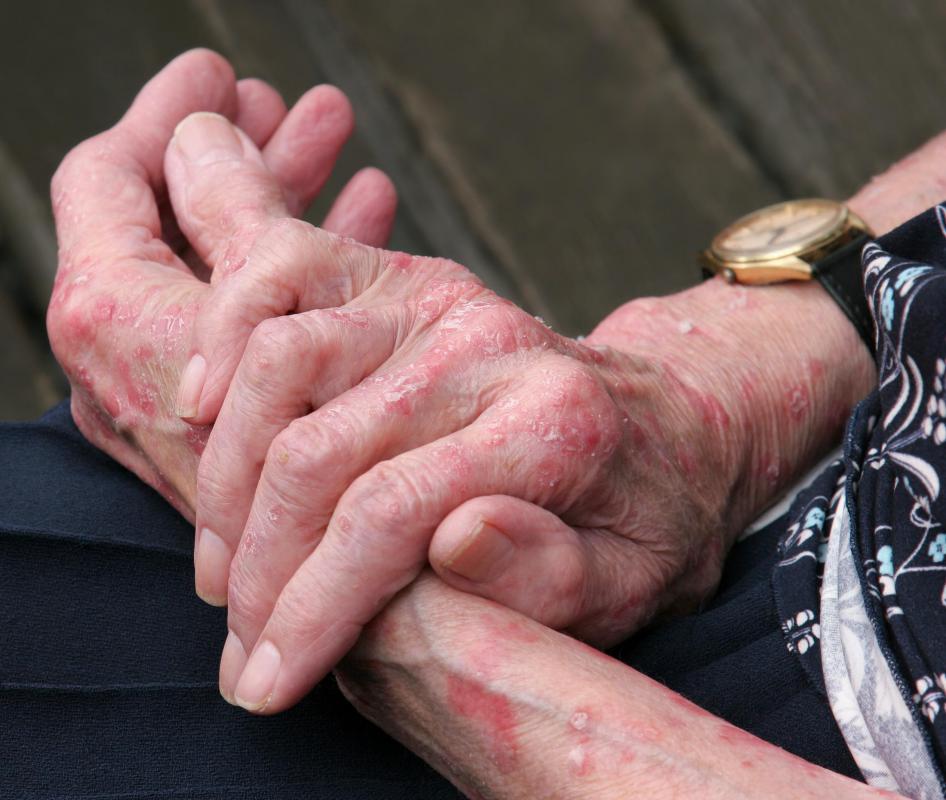At TheHealthBoard, we're committed to delivering accurate, trustworthy information. Our expert-authored content is rigorously fact-checked and sourced from credible authorities. Discover how we uphold the highest standards in providing you with reliable knowledge.
What are Viral Hives?
Viral hives are raised bumps or welts that develop on a person’s body because of a virus. They are usually itchy or cause pain and may last for as little as a few minutes or as long as a few weeks. Some people even develop chronic hives that last for months at a time. Hives are usually caused by the body's reaction to an allergen or irritant. Sometimes, however, they develop as the immune system reacts to a virus and stimulates the release of chemicals called histamines into the body.
The symptoms of viral hives are the same as symptoms of hives that are caused by allergens. In most cases, a person with hives will have raised welts that develop on various parts of his body. The welts may be different sizes and are often described as red or white in color. A person may have hives that cover almost every part of his body or just one part of it. Interestingly, some people have even reported developing hives inside their mouths.

When a person has viral hives, he may notice that they come and go. For example, a hive or cluster of hives may seem to go away for a bit. Soon after this happens, however, new hives may develop. Hives also are often accompanied by severe itching, and some people even report that they hurt or burn. Pain caused by hives is less likely to develop than itchiness, however.

An individual develops viral hives in relation to some type of virus. For example, a person with mononucleosis, the flu or cytomegalovirus may develop them. An individual may also develop them in relation to such viruses as herpes, Epstein-Barr virus, and hepatitis. Additionally, human immunodeficiency virus (HIV), which is the virus that causes acquired immune deficiency syndrome (AIDS), may also cause hives in some cases.

The development of viral hives is typically caused by the reaction the body has to a viral invader. In the case of viral hives, a person’s immune system goes into action to fight the virus. As part of this process, the immune system causes the release of a chemical called histamine that, in turn, leads to hives.
Treatment for viral hives may include treatment for the underlying viral condition as well as medications that temporarily eliminate hives. In most cases, doctors recommend antihistamines to treat hives, and over-the-counter varieties often prove effective. Sometimes, however, medications called corticosteroids, which are steroid hormones, are prescribed as well.
AS FEATURED ON:
AS FEATURED ON:















Discussion Comments
@Monika - It is hard to avoid scratching hives though, even if you know it's not going to help. I actually had a pretty bad case of hives when I was in college, and one thing I found that helped was to keep my skin moisturized, in addition to taking the medicine my doctor prescribed for me.
I had viral hives a few years ago, and they really did come and go. It was the strangest thing. I would get hives on one area of my body, like my arm, for awhile. Then, those would go away, and I would start itching somewhere else. Then hives would pop up there.
I think one of the main things when you have any kind of hives is to avoid scratching at them. Scratching just makes it worse, even though you think it's helping.
@strawCake - I've taken corticosteroids for hives on skin before also. I just wanted to mention the side effects in case anyone reading this article is about to start on steroids for viral hives.
Corticosteroids can make you nervous and jumpy (it did me) and it can also make you gain a little bit of weight. And, since it lowers your immune defenses, you can develop a secondary infection after taking it.
I actually had chronic hives from an allergic reaction that lasted for about 6 weeks. I had no idea there were other causes of hives than allergies though. It's interesting that the body seems to react the same way to allergies as it does to viruses in some instances.
Either way, it sounds like the treatment is pretty similar. When I had my chronic hives, I took antihistamines. However, they didn't work, so I ended up having to take a fairly long course of corticosteroids to solve the problem.
Post your comments